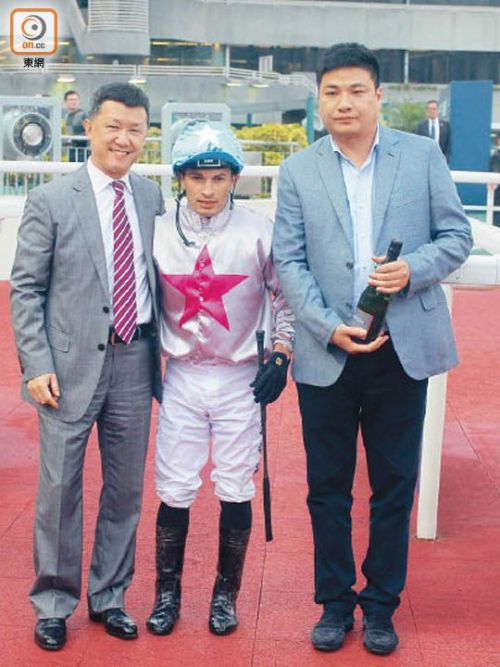蔡华波
个人信息
1985年5月17日出生,新加坡籍,香港身份证号:M521053(6)(2004年9月15日办理),香港护照号:K90231753(2005年6月9日—2015年6月9日)
链接
照片(右)
原文
When Chua Hwa Por (蔡华波) began buying a stake in Hong Kong & Shanghai Hotels -- the holding company of The Peninsula -- early this year, he could not have imagined the troubles that would follow.
It was supposed to be just another item on a routine shopping list that most princelings, or well-connected ones from mainland China must have, to begin their Hong Kong venture.
The 32-years-old already owns a race horse at more than 1 million Euros (HK$9.63 million), a HK$120 million (US$15 million) bungalow in Stanley, a HK$500 million office on the top floor of The Center, and a listed company to build his empire with. So the luxury hotel group controlled by the Kadoorie family is just another prime asset to park his spare cash in.
The Peninsula hotel in Beijing. Since late June, Chua’s stake has gradually climbed from below 5 per cent to 11.79 per cent, costing an estimated HK$1.5 billion. He didn’t even bother to hide behind an investment group or fund.
What Chua has underestimated is the interest in himself that the deal has stirred up.
In his regulatory filing, Chua portrayed himself as a Singaporean with nine years’experience in investment. But his wealth was too vast, and his Zhejiang accent didn’t quite jive with someone from Lion City.
A Hong Kong magazine tailed him for days before reporting last week that Chua had filed the same residential address on Stanley Beach Road as a woman named Li Qianxin (栗潜心), through a company called Chua & Li Membership. Li owns the house via a company called Century Joy, according to Company Registry and Land Registry records, obtained by Money Matters.
The woman’s Chinese surname is rare, so rare in fact that it’s not even among the 100 most-used family names for the entire Chinese population. You’ll have to look to number 249 to find the surname, used among just an estimated 300,000 people in the entire country.
Chua’s Limitless galloping on the all weather track at Sha Tin on February 17. This is an illustrious clan, with prime ministers and high officials through the centuries. The most famous, and highest-ranking Li out of the current clan, would be Li Zhanshu (栗战书), the right-hand man to the Chinese president Xi Jinping.
His job titles are Director of the General Office of the Communist Party and the Chief of the General Office of the National Security Commission, roughly equivalent to the Chief of Staff in the US government. He’s one of the most powerful men in the Communist Party and could be on the path to promotion when the party meets this autumn to pick their leaders for the next five years.
On paper, Li Qianxin’s name looks the same as Li Zhanshu’s daughter. How is Chua, who owns 73.7 per cent of Tai United Holdings Ltd., related to an up-and-coming Chinese state leader?
Li Zhanshu (L), and former U.S. Treasury Secretary Henry Paulson at a U.S.-China business roundtable in September 2015. According to Tai United staff, madam Li had been seen at the company on at least two occasions giving instructions to employees. Neither he nor the company would respond to queries.
Instead, Chua resigned as Tai United’s chairman and executive director on July 11, citing other business engagement immediately followed the press revelation.
Three days after his resignation, Chua and Li left for Beijing on a 7 am flight, sources said, and have not been seen since in Hong Kong. Meanwhile, Chua’s purchase of shares in Hong Kong & Shanghai Hotels came to a halt as of July 10, the day before he resigned from Tai United’s board.
You may find these reactions comical. Yet, with a few months to go before the Communist Party picks its leaders, it’s not hard to imagine everybody on tippy toes, or the political shock caused by the revelation.
In Xi’s anti-corruption campaign, whoever that’s aiming for the next leadership role will not want to be seen, or even to be rumoured, as the father of a fat cat.
Whether Chua is indeed a princeling can’t be verified except through his own mouth, but he did command enough clout to transform Tai United from a distributor of medical devices into a financial powerhouse. Its business description now says it’s in distressed assets management, tungsten mining, commodities and securities trading. It also owns two real estate projects in London.
That was the result of a HK$3.5 billion investment spree funded by his HK$3 billion investment and HK$1.3 billion in lending by financial firms including Haitong Securities.
That was only a third of the HK$10 billion investment plan that Tai United had pledged. Among them was the acquisition of a financial company in China.
Tai United’s management team comprises chairman Meng Zhaoyi, who used to head the property insurance division at the People’s Bank of China and had worked at Taiping Insurance.
Ye Fei the senior vice president is a former vice president at Taiping Life Insurance while Xu Ke the executive director used to work for China Cinda Asset Management.
This is not a team that any ordinary Singaporean private entrepreneur could muster.
评论区
<comments/>
